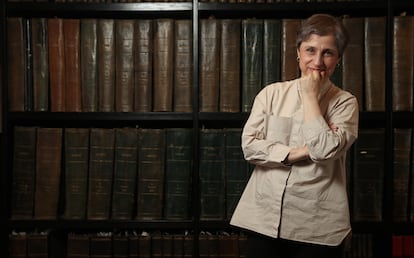Mexican reporter Carmen Aristegui: ‘There is a war against critical journalism’
The news and opinion writer just won Spain’s ‘Diario Madrid Award’ and was named a World Press Freedom Hero by the International Press Institute


Carmen Aristegui may be one of Mexico’s most popular, respected and feared journalists these days. Sharp and tough while she’s working, she is charming in person. Founder and director of the award-winning Aristegui Noticias website, she’s also the anchor of the Aristegui news program on CNN en Español, and has almost eight million followers on Twitter. On April 26, she was in the capital of Spain to be presented with the “Diario Madrid Award” at the Association of European Journalists meeting. Aristegui intends to donate the €12,000 ($13,300) cash prize to the Nicaraguan media persecuted by Daniel Ortega’s regime. She was also named a World Press Freedom Hero this week by the International Press Institute (IPI). “It’s tremendous. I’m sure I’ll become insufferable,” she joked.
Question. Journalism in Mexico is very high-risk – it’s the country at peace with more journalist deaths, even more than in Ukraine.
Answer. That is the most serious issue here – the murder of journalists. Artículo 19 [an organization that works in Mexico to monitor attacks on freedom of expression] reported the murders of 12 journalists in 2022 and over 100 in recent years. It’s a disgrace that unfortunately persists because it goes hand in hand with the impunity of a country without a justice system willing to punish those responsible. Few of the perpetrators have been prosecuted, which is almost an invitation to murder for those who feel threatened by journalism.
Q. Mexico’s president, Andrés Manuel López Obrador, sometimes singles out journalists by name in his morning news briefings – even you, who expressed some goodwill for his candidacy. What happened?
A. I have never supported anyone politically. Instead of cozying up to politicians, I always try to remain open and impartial. I think I showed that in significant ways over the past few years with López Obrador. He has been Mexico’s leading opposition figure for decades, and finally became president after three attempts. But he made a political decision to polarize, divide, and attack the reputations of journalists and critical voices. Does he like my work? Clearly not. Does he like my criticism of how he is running the country? Certainly not. The president seems to want an acquiescent press that supports his policies, instead of one that does journalism. Those who disagree with him become adversaries. Anyone who refuses to cheer him on becomes an enemy, someone to be vilified.
Q. Do you feel threatened? Another journalist and frequent target of the president – Ciro Gómez Leyva – was attacked last December in downtown Mexico City.
A. While some doubt remains, the federal government doesn’t seem to be behind the attack on Ciro Gómez Leyva. It looks like some criminal’s revenge for something Gómez published. I don’t think many journalists are worried about violent attacks by the federal government, but there is more concern about municipal and state governments.
Q. Singling out journalists by name can encourage violence against them...
A. Yes, that’s an issue. Verbal violence can incite other types of violence.
Q. You have been critical of every president and party: Felipe Calderón (PAN party), Enrique Peña Nieto (PRI party), and now López Obrador (Morena party). Is that still the essential function of journalism in a world of social media likes?
A. I cannot imagine uncritical journalism – criticism is inherent to the activity. Otherwise, it would just be another [documentation] task. It is very important for a democracy to have eyes watching those in power and pointing out what’s not working.
Q. Is freedom of expression at risk in Mexico?
A. Everything we have gained seems to be eroding.
Q. Is the crisis in journalism connected to the crisis in democracy?
A. There is a war against critical journalism – you only have to look at Donald Trump, Jair Bolsonaro, Nayib Bukele, Nicolás Maduro and Daniel Ortega. These political leaders have calculated the political advantage of having enemies in a polarized system, and chief among them is a critical press.
Q. What do you think of López Obrador’s recent vow to shut down Notimex, the official Mexican news agency? Is that the reason for the morning news briefings?
A. Pathetic. If they planned right off the bat to close it down, they would have done it formally. Instead, they let an agonizingly slow death unfold that culminated in this pathetic statement. First, it [Notimex] should be regarded as a state information agency, not a government mouthpiece. To say that this is the reason for the morning news briefings shows that the government doesn’t want a state agency providing a useful information service for democracy.
Q. Is artificial intelligence (AI) the beginning of the end of journalism?
A. It certainly makes us laugh but also tremble in fear. We’ve never seen a technology that can create narratives on its own like this. What we once thought of as a human monopoly is no longer. It’s a substantive change of unknown dimensions, but we have to take it seriously. Use of these nascent tools is running wild and will soon become massive. How will publishing, film, advertising, television and storytelling be taken over by AI? We must take it very seriously. I don’t know how far it will go, but it’s certainly a tipping point for civilization.
Sign up for our weekly newsletter to get more English-language news coverage from EL PAÍS USA Edition
Tu suscripción se está usando en otro dispositivo
¿Quieres añadir otro usuario a tu suscripción?
Si continúas leyendo en este dispositivo, no se podrá leer en el otro.
FlechaTu suscripción se está usando en otro dispositivo y solo puedes acceder a EL PAÍS desde un dispositivo a la vez.
Si quieres compartir tu cuenta, cambia tu suscripción a la modalidad Premium, así podrás añadir otro usuario. Cada uno accederá con su propia cuenta de email, lo que os permitirá personalizar vuestra experiencia en EL PAÍS.
¿Tienes una suscripción de empresa? Accede aquí para contratar más cuentas.
En el caso de no saber quién está usando tu cuenta, te recomendamos cambiar tu contraseña aquí.
Si decides continuar compartiendo tu cuenta, este mensaje se mostrará en tu dispositivo y en el de la otra persona que está usando tu cuenta de forma indefinida, afectando a tu experiencia de lectura. Puedes consultar aquí los términos y condiciones de la suscripción digital.








































